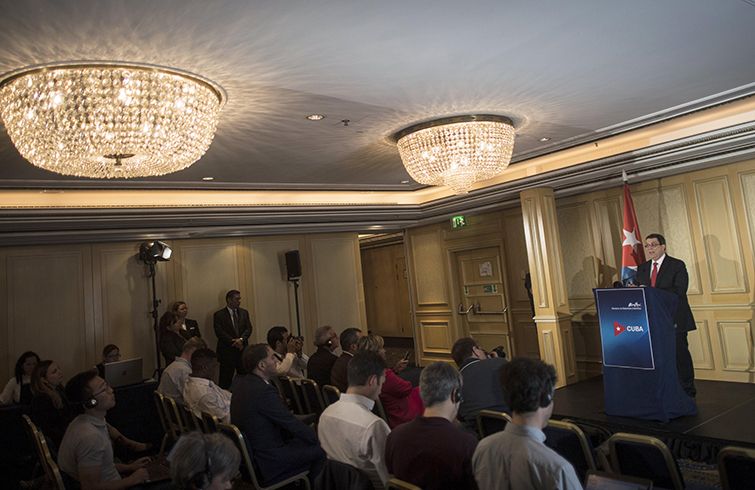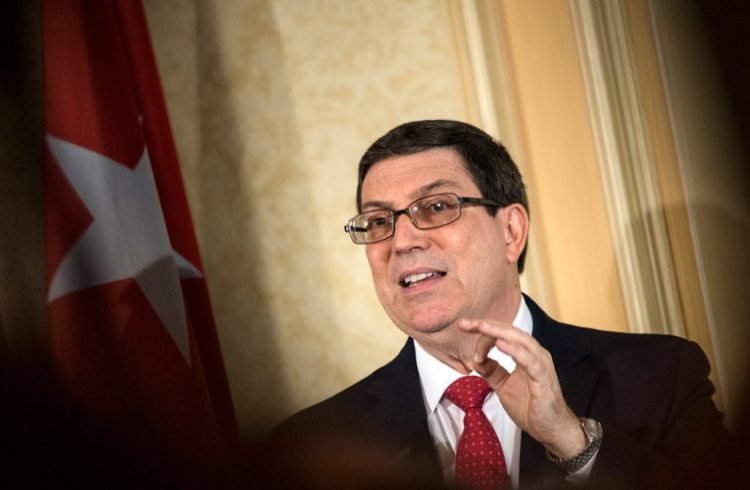“Trump’s policy marks a rollback in bilateral relations,” said Cuban Foreign Minister Bruno Rodríguez Parrilla in a press conference this Monday.
The foreign minister described the U.S. president’s presentation last Friday in Miami as “a grotesque Cold War show” and warned that Cuba will not negotiate under pressure.
“Cuba will not negotiate its principles or accept conditions,” he said.
Referring to Trump’s cited promise of achieving “a better deal” with Cuba than that of the Obama administration, Rodríguez ruled out that what was announced is coherent with that and described what “a better deal” or agreement with Cuba would imply: lifting the blockade, returning the illegally occupied territory in Guantanamo and an agreement for mutual compensations.
Moreover, he pointed out that the measures “will affect the U.S. government’s relations with Latin America and the Caribbean” and will harm “the credibility of his foreign policy.”
Rodríguez Parrilla described as “unpopular” the regulations that “ignore the majority support for the lifting of the blockade and the normalization of relations with Cuba by U.S. Congress members, many of them Republicans; for the business sector; for diverse civil society organizations, for the Cuban émigrés and public opinion in general.”
Trump announced new restrictions to trips by U.S. citizens to Cuba and to business linked to the island’s armed forces and intelligence services.
According to the Cuban foreign minister, these measures “will restrict the freedoms of U.S. citizens, will cost taxpayers their money, will reduce the opportunities of their companies and businesspeople in the face of the competition and they will lose income and employment.”
However, he added that it is necessary to wait “for the United States to make known the regulations that those measures will implement before opining on their reach and depth.”
He criticized the political manipulation of the issue of human rights in what he called “the imperial announcement,” and advanced that the U.S. citizens in Cuba under political asylum will not be returned to their country. In recent years 12 fugitives of justice have been repatriated to the United States, but it will not be the fate of those protected on the island as fighters for civil rights in the U.S. Those persons will not be returned to the United States, which lacks a legal, political and moral foundation to reclaim them,” he said.
Speaking of the promise of toughening the laws for bilateral commerce, he said that “it will be in this administration or the following one, but there is no doubt that history…will force a U.S. administration to lift the blockade and normalize relations with Cuba,” he affirmed. “And we will have all the patience, resilience, decision and patience,” he insisted, “to wait for that moment to come and especially to actively work for that to happen.”

In his speech, Rodríguez said that Trump’s policy has no knowledge of the “overwhelming majority opinion of the Cuban people, which wants to have better relations with the U.S. people,” while it will cause human damages and privations to the Cuban families.
“It will bring about economic damages, not just to state-run companies in Cuba, but also to the cooperatives, the self-employed and private workers,” he added.
While the foreign minister said it is still not known “whether this government will be a valid interlocutor,” he insisted more than once on Cuba’s will to continue “the respectful dialogue, and cooperation on issues of mutual interest and negotiating pending bilateral affairs”; but “based on equality and absolute respect for our independence and sovereignty.”










